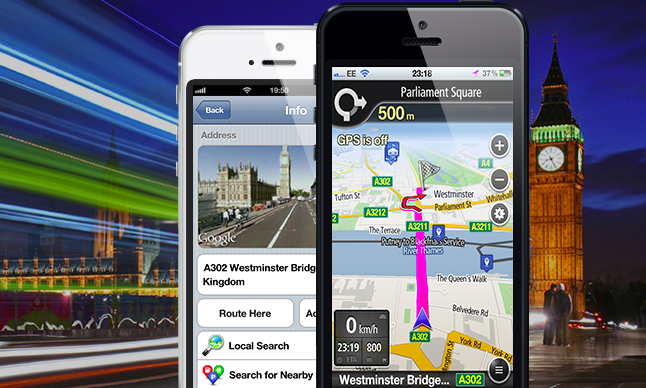After Google acquired Waze last June, reportedly for $1.1 billion upwards, there followed much speculation surrounding which mapping startup might be next to exit.
Yesterday we closed the loop on one rumour — that maps and navigation app maker Skobbler had been approached by several “major tech companies” interested in making an acquisition — confirming that Telenav has acquired the Berlin-based startup for just shy of $24 million.
However, TechCrunch understands that Skobbler wasn’t the only OpenStreepMap-powered startup to be on Telenav’s radar. We’re hearing that the U.K.’s Navmii, maker of Navfree, the free mapping and navigation app for iOS and Android, was also being eyed up as a target.
According to sources close to the London-based company, it held talks with NASDAQ-listed Telenav over a possible acquisition last February. It’s my understanding that those talks may have even gone as far as Telenav placing a formal offer for Navmii on the table, though in the end it didn’t progress any further. Why that was, is unclear, though we’ve heard that a difference in valuation may have been an issue.
The same sources also say that, around the same time, Navmii was holding exploratory meetings with a major player in Silicon Valley, although this may have been of the kind that happen as a matter of routine. We also understand talks were held with a third “major company” in the mobile space. However, it’s here where things dry up, so take that as you will.
Founded in 2009, Navmii builds various sat-nav and mapping solutions, including its own apps and for others. However, its flagship and best known product is Navfree, which was one of the first free navigation apps for iOS when it was released in 2010. It has since added support for Android and is available in 52 countries.
Like Skobbler, the app is powered by the ‘Wikipedia of maps’ OpenStreetMap (OSM) data. It offers turn-by-turn voice navigation, including support for offline maps, as well as points of interest (POI) and various other mapping-related features, some paid-for. Notably, similar to Waze, it also employs crowdsourcing for its traffic data, collecting 3 billion points of speed traffic data every month. And, as Waze has proven, crowdsourced ‘realtime’ traffic data, coupled with enough users, can be a valuable proposition, so this could be the basis for any acquisition.
To that end, Navfree claims 17.5 million users in total — defined as downloads/registrations. Meanwhile, Navfree told me last June that users were averaging 30,000 map corrections per month, fed back to the OSM data that powers the app’s maps. Navfree makes money for the company primarily by selling anonymous data, as well as through in-app advertising, and in-app purchases for a number of premium features.
As we noted following Google’s purchase of Waze, where at one time Apple, Facebook and Microsoft were also linked to the Israeli startup, mapping is increasing in importance for major technology companies as more and more computing activity is mobilised onto smartphones and tablets, and away from the static desktop world. Having access to location information isn’t just handy for users, but it’s of strategic significance as location-based services and advertising become ever more important.
There are relatively few global mapping companies in play, too, with the major ones being Google, Navteq (Nokia), and Tele Atlas, while others such as Apple are scrambling to play catch up.
What value any potential acquirer will put on Navmii’s map app building expertise or its strength within the OSM ecosystem and its own crowdsourced traffic data and existing install base, is hard to say.
That said, in Telenav’s ~$24 million acquisition of Skobbler ($19.2 million in cash, along with $4.6 million in common stock), we now have a further data point in addition to Google’s acquisition of Waze.
We also know that Navmii has raised £4 million in outside funding to date, most recently £2 million in June 2012 from investors advised by Talis Capital, so a decent return isn’t asking for anything on the scale of Waze’s $1 billion-plus exit.
